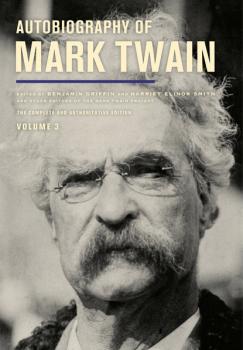Mark Twain Papers
Скачать книги из серии Mark Twain PapersAutobiography of Mark Twain, Volume 3
The surprising final chapter of a great American life. When the first volume of Mark Twain’s uncensored Autobiography was published in 2010, it was hailed as an essential addition to the shelf of his works and a crucial document for our understanding of the great humorist’s life and times. This third and final volume crowns and completes his life’s work. Like its companion volumes, it chronicles Twain's inner and outer life through a series of daily dictations that go wherever his fancy leads. Created from March 1907 to December 1909, these dictations present Mark Twain at the end of his life: receiving an honorary degree from Oxford University; railing against Theodore Roosevelt; founding numerous clubs; incredulous at an exhibition of the Holy Grail; credulous about the authorship of Shakespeare’s plays; relaxing in Bermuda; observing (and investing in) new technologies. The Autobiography’s «Closing Words» movingly commemorate his daughter Jean, who died on Christmas Eve 1909. Also included in this volume is the previously unpublished «Ashcroft-Lyon Manuscript,» Mark Twain’s caustic indictment of his «putrescent pair» of secretaries and the havoc that erupted in his house during their residency. Fitfully published in fragments at intervals throughout the twentieth century, Autobiography of Mark Twain has now been critically reconstructed and made available as it was intended to be read. Fully annotated by the editors of the Mark Twain Project, the complete Autobiography emerges as a landmark publication in American literature. Editors: Benjamin Griffin and Harriet Elinor Smith Associate Editors: Victor Fischer, Michael B. Frank, Amanda Gagel, Sharon K. Goetz, Leslie Diane Myrick, Christopher M. Ohge
Autobiography of Mark Twain, Volume 2
Mark Twain’s complete, uncensored <i>Autobiography</i> was an instant bestseller when the first volume was published in 2010, on the centennial of the author’s death, as he requested. Published to rave reviews, the <i>Autobiography</i> was hailed as the capstone of Twain’s career. It captures his authentic and unsuppressed voice, speaking clearly from the grave and brimming with humor, ideas, and opinions.<br> <br> The eagerly-awaited Volume 2 delves deeper into Mark Twain’s life, uncovering the many roles he played in his private and public worlds. Filled with his characteristic blend of humor and ire, the narrative ranges effortlessly across the contemporary scene. He shares his views on writing and speaking, his preoccupation with money, and his contempt for the politics and politicians of his day. Affectionate and scathing by turns, his intractable curiosity and candor are everywhere on view.<br> <br> Editors: Benjamin Griffin and Harriet E. Smith<br> Associate Editors: Victor Fischer, Michael B. Frank, Sharon K. Goetz and Leslie Diane Myrick<br>
Mark Twain's Which Was the Dream? and Other Symbolic Writings of the Later Years
All of these selections in this volume were comosed between 1896 and 1905. Mark Twain wrote them after the disasters of the early and middle nineties that had included the decline into bankruptcy of his publishing business, the failure of the typsetting machine in which he invested heavily, and the death of his daughter Susy. Their principal fable is that of a man who has been long favored by luck while pursuing a dream of success that has seemed about to turn into reality. Sudden reverses occur and he experiences a nightmarish time of failure. He clutches at what may be a saving thought: perhaps he is indeed living in a nightmare from which he will awaken to his former felicity. But there is also the possibility that what seems a dream of disaster may be the actuality of his life. The question is the one asked by the titles that he gave to two of his manuscripts: «Which Was the Dream?» and «Which Was It?» He posed a similar question in 1893: «I dreamed I was born, and grew up, and was a pilot on the Mississippi, and a miner and journalist…and had a wife and children…and this dream goes on and on and <i>on</i>, and sometimes seems so real that I almost believe it is real. I wonder if it is?» Behind this naïve query was his strong interest in conscious and unconscious levels of mental experience, which were then being explored by the new psychology.
Autobiography of Mark Twain, Volume 1
"I've struck it!" Mark Twain wrote in a 1904 letter to a friend. «And I will give it away—to you. You will never know how much enjoyment you have lost until you get to dictating your autobiography.» Thus, after dozens of false starts and hundreds of pages, Twain embarked on his «Final (and Right) Plan» for telling the story of his life. His innovative notion—to «talk only about the thing which interests you for the moment»—meant that his thoughts could range freely. The strict instruction that many of these texts remain unpublished for 100 years meant that when they came out, he would be «dead, and unaware, and indifferent,» and that he was therefore free to speak his «whole frank mind.» The year 2010 marks the 100th anniversary of Twain's death. In celebration of this important milestone and in honor of the cherished tradition of publishing Mark Twain's works, UC Press is proud to offer for the first time Mark Twain's uncensored autobiography in its entirety and exactly as he left it. This major literary event brings to readers, admirers, and scholars the first of three volumes and presents Mark Twain's authentic and unsuppressed voice, brimming with humor, ideas, and opinions, and speaking clearly from the grave as he intended. <br /><br />Editors: <br /><br />Harriet E. Smith, Benjamin Griffin, Victor Fischer, Michael B. Frank, Sharon K. Goetz, Leslie Myrick





